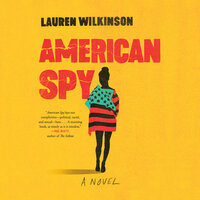You need to sign in or sign up before continuing.
Take a photo of a barcode or cover
This felt like it ended too soon? Idk it's missing something. I wanted to know what happened to her after she left her kids. Did she die? Did she end it and live?
Given the thread in which I found this book, I was expecting more espionage and more intrigue. This is almost all character development. 3.5
3.75 Rounded up to 4. I love the premise and power of this book, a badass black female American spy in the 70s/80s writing a journal to her children about her life after they have to flee the US when someone has attacked her in the night.
"It has never earned me anything to share my darker self with other people. The only anger I ever expose to the world is through implication, by suggesting that I'm on the brink of no longer being able to contain my fury. That is what a woman's strength looks like with it is palatable. Like she is containing herself."
There was so much to love about this book, the storyline and background about the FBI and CIA's involvement in politics in Africa during that time period, a black woman heroine claiming her power and badassery, so much culture that I really have no clue about. I loved the concept that mothering is revolutionary.
But some also fell flat for me too. I felt the pacing was a little slow and disjointed and in the end, I didn't CARE enough about Marie to really care about her story. Perhaps it was because she was writing to her children so necessarily withheld portions of herself like you would to protect, but because of that, her character felt cold and distant and instead of feeling like part of her story, I felt like an outsider having found this journal on the street and not connecting it to a real person.
The intrigue was...intriguing, but the characters less so.
Mad props to Bahni Turpin though who is an AMAZING narrator and probably kept me going through this book when I would have put it down had I been reading it with my eyes instead of my ears.
"It has never earned me anything to share my darker self with other people. The only anger I ever expose to the world is through implication, by suggesting that I'm on the brink of no longer being able to contain my fury. That is what a woman's strength looks like with it is palatable. Like she is containing herself."
There was so much to love about this book, the storyline and background about the FBI and CIA's involvement in politics in Africa during that time period, a black woman heroine claiming her power and badassery, so much culture that I really have no clue about. I loved the concept that mothering is revolutionary.
But some also fell flat for me too. I felt the pacing was a little slow and disjointed and in the end, I didn't CARE enough about Marie to really care about her story. Perhaps it was because she was writing to her children so necessarily withheld portions of herself like you would to protect, but because of that, her character felt cold and distant and instead of feeling like part of her story, I felt like an outsider having found this journal on the street and not connecting it to a real person.
The intrigue was...intriguing, but the characters less so.
Mad props to Bahni Turpin though who is an AMAZING narrator and probably kept me going through this book when I would have put it down had I been reading it with my eyes instead of my ears.
A fast faced and enjoyable book, but wish that the relationships between Marie and her family were explored more.
This book had me trying to read faster and faster to find out what happened.
Although this book was a slow starter, it was worth the read. The Cold War is one of my favorite eras of history to study, and this book gave me even more perspective from a very unique point-of-view.
I think more people should read this book, and remind themselves that the "American Way" of blind patritoism is dangerous. Americans have long been colonizers and asimilationist, and forget to acknowledge that our way of life and governing is oppressive when forced onto other places in the world. It is sad to think we are STILL waving our flags around in the faces of countries who are not like us, and that many fail to realize that it is okay to be different. Sometimes it even means life can be BETTER if you stop following blind patritoism and look at what is best for everyone - not just the white, upper-class male. Okay, I'll get off my soap-box now. But, seriously, give this a read.
I think more people should read this book, and remind themselves that the "American Way" of blind patritoism is dangerous. Americans have long been colonizers and asimilationist, and forget to acknowledge that our way of life and governing is oppressive when forced onto other places in the world. It is sad to think we are STILL waving our flags around in the faces of countries who are not like us, and that many fail to realize that it is okay to be different. Sometimes it even means life can be BETTER if you stop following blind patritoism and look at what is best for everyone - not just the white, upper-class male. Okay, I'll get off my soap-box now. But, seriously, give this a read.
I finished this book in 2 days, which for an audiobook is QUICK. Bahni Turpin once again does a story complete justice; she is one of my favorite narrators.
American Spy is at once a complex and simple story. The writing is utterly engrossing. It’s told as a semi-epistolary novel - a mother writing the story of her life to her twin sons. If it weren’t based on a true story I’d say some of it is too far-fetched for fiction, but the way the US and USSR behaves in Africa in the Cold War is astonishing.
I recommend this to people who love spy novels, or those who usually lean toward nonfiction and are looking for something to bridge the fiction/nonfiction gap.
American Spy is at once a complex and simple story. The writing is utterly engrossing. It’s told as a semi-epistolary novel - a mother writing the story of her life to her twin sons. If it weren’t based on a true story I’d say some of it is too far-fetched for fiction, but the way the US and USSR behaves in Africa in the Cold War is astonishing.
I recommend this to people who love spy novels, or those who usually lean toward nonfiction and are looking for something to bridge the fiction/nonfiction gap.
this book was such an interesting concept and so promising to me! sadly, it fell slightly short of my expectations.
I loved the main character and her relationship with each of her family members, particularly her sister, of course. her relationship with her mother, her father, and her sister was uniquely complicated, flawed and loving in a beautifully human way, and I loved learning more about what caused those relationships to unfold as they did.
I also really enjoyed reading about the political context of the time in New York, Martinique, and Burkina Faso. this international story taking place in 1986 at the height of the Cold War is clearly a well-researched journey - and based on true events!
I found the structure of the book very endearing, as well. writing the book as a letter to her sons was very confusing at first, and I had to read whole paragraphs twice or three times in the beginning to track characters and relationships, but soon I was enveloped in the story.
I was so excited after the first few pages of this book for an exciting and fast-paced spy novel, and that’s just not in the design of this book. this book is much more of a family history, social and political commentary, and history of international relations than it is a spy novel. I was sadly bored in many moments and it took me so long to get through this book. I think that is because I was expecting a spy novel and instead got this deeply interesting and complicated unpacking of what it means to be a Fed and the ethics behind US intervention in governments internationally. which I found really interesting, but not the pace of a spy novel.
I think the main reasons I returned to the book even when I was a bit bored were our main character, her life story, and the interesting political climate the story discussed. the pace was off for me sadly but the writing is really strong! I rated this 3 stars on Goodreads & think I would recommend to some people, but not generally.
I loved the main character and her relationship with each of her family members, particularly her sister, of course. her relationship with her mother, her father, and her sister was uniquely complicated, flawed and loving in a beautifully human way, and I loved learning more about what caused those relationships to unfold as they did.
I also really enjoyed reading about the political context of the time in New York, Martinique, and Burkina Faso. this international story taking place in 1986 at the height of the Cold War is clearly a well-researched journey - and based on true events!
I found the structure of the book very endearing, as well. writing the book as a letter to her sons was very confusing at first, and I had to read whole paragraphs twice or three times in the beginning to track characters and relationships, but soon I was enveloped in the story.
I was so excited after the first few pages of this book for an exciting and fast-paced spy novel, and that’s just not in the design of this book. this book is much more of a family history, social and political commentary, and history of international relations than it is a spy novel. I was sadly bored in many moments and it took me so long to get through this book. I think that is because I was expecting a spy novel and instead got this deeply interesting and complicated unpacking of what it means to be a Fed and the ethics behind US intervention in governments internationally. which I found really interesting, but not the pace of a spy novel.
I think the main reasons I returned to the book even when I was a bit bored were our main character, her life story, and the interesting political climate the story discussed. the pace was off for me sadly but the writing is really strong! I rated this 3 stars on Goodreads & think I would recommend to some people, but not generally.




